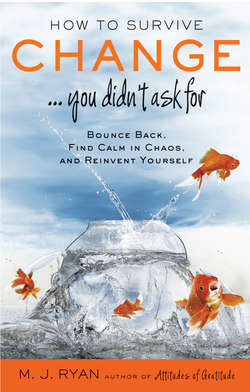Читать книгу How to Survive Change . . . You Didn't Ask for - M. J. Ryan - Страница 13
На сайте Литреса книга снята с продажи.
CHANGE TRUTH #5
ОглавлениеThere's a Predictable Emotional Cycle to Change
Change represents the end of your old self. You can look back, but you can't go back.
—Robert Hellenga
“I can't believe this is happening to me,” said the CEO on the other end of my phone line. “They just offered me a contract extension and three months later they're telling me I'm fired. I'm in shock.”
Whether you are experiencing a reorganization in your company or bad news in your personal life, change not of your choosing often sets off an emotional process that experts say follows a predictable cycle. Not surprisingly, this cycle is similar to Elisabeth Kübler-Ross's five stages of grief: denial (“This can't be happening to me”); anger (“How dare this happen, it's not fair”); bargaining (“I'll do anything not to have to go through this”); depression (“Why try?”); and acceptance (“It's happening and I can handle it”). That's because unasked-for change always represents a death of some sort—the death of homeownership, for instance, or the dream of parenthood or of an early retirement. It is the death of your expectations for the future. That's why Anatole France said, “All changes . . . have their melancholy; for what we leave behind us is a part of ourselves; we must die to one life before we can enter another.”
Whatever you're going through right now and whatever this change means to you, there's always a sense of loss of control. With change that comes from the outside, we aren't in charge of what's happening, and that is very uncomfortable, to say the least. Change experts Ann Salerno and Lillie Brock understand this truth. In their book The Change Cycle they note that any change creates “change pain.” People are “sad, mad, angry, blaming, afraid,” which often drives them “into uncharted emotional waters.” Like Kübler-Ross, they describe a movement from shock through difficult negative feelings and ultimately to acceptance and integration. The process may not be linear or swift. You may circle back around to a stage you thought you passed, and it may take longer than you might guess or wish. But ultimately the journey is one of reconciliation with what is and the growth of new possibilities.
What's important to understand here is that there is a natural trajectory in unasked-for change that is characterized by particular feelings. That way you can take some comfort in the fact that what you are feeling is normal and that it does have a positive progression, even if you never come to appreciate the change itself. When you understand that what you are experiencing is grief, you can be gentle with yourself as you go through the process. If you suddenly lost a loved one, would you expect yourself to be forging ahead at the top of your game? You'd be aware that you're suffering a loss and make sure to treat yourself kindly.
According to resiliency research, Change Masters allow themselves to feel their difficult feelings, but they don't take them on as a permanent state. The part “Accept the Change” offers a number of practices for dealing with your difficult feelings while adapting and adjusting to the new reality. As psychiatrist Steven Wolin points out on www.psychologytoday.com, it is “possible to be hurt and rebound at the same time. We human beings are complex enough psychologically to accommodate the two.”
What about my client, the CEO? It's several months later now. He's gone through denial and anger, and is moving from bargaining and depression to acceptance as he begins to receive nibbles regarding a new job and to experience the benefits of not working a hundred hours a week anymore. “I've got time for my daughter, finally,” he exclaimed the other day, “and to do some things I love that I haven't had a chance to do for the past five years.” At some point you, too, will discover a light at the end of the change tunnel.
Cultivate Both/And Thinking
It's possible to both feel bad and move on. It requires that we practice both/and thinking, rather than either/or: “Yes, I feel terrible about losing my house and I can make where I'm renting as pleasant as possible”; “Yes, I made financial mistakes and I'm still a responsible person.” Cultivating the ability to hold both beliefs helps us to experience our feelings and rebound, and is one of the foundations of wisdom. Life—and our self—is just too complex for us to get trapped in either/or. So whenever you catch yourself thinking either this or that, challenge yourself to think both/and.
